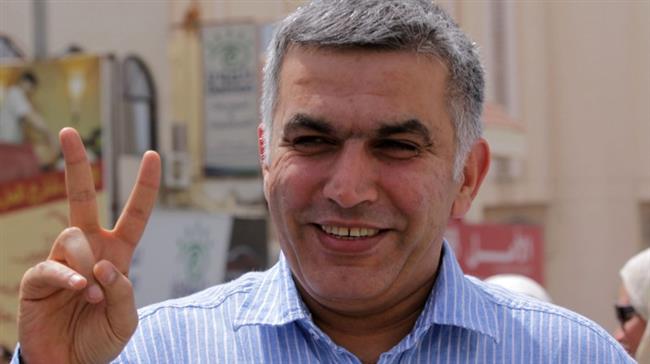
RNA - The groups, in an open letter addressed to Bahraini officials, to “quash his convictions and sentences, and drop all charges against him.”
The letter also asks for an independent investigation into the mistreatment of the 53-year-old president of the Bahrain Center for Human Rights in detention, besides as an end to all abuses against Bahraini rights campaigners and journalists.
“We are concerned that the authorities intend to increase Rajab’s prison sentence unopposed, by setting 31 December as the date for a hearing and possible issuing of a verdict, while most Bahrainis and people around the globe will be focused on year-end celebrations,” the rights groups noted in their letter.
On February 21, a court in Bahrain sentenced the distinguished human rights activist to five years in prison over tweets deemed critical of the Manama regime and the deadly Saudi-led war against Yemen.
Bahrain’s Court of Cassation, which has the ultimate say in the case of appeals in the country, is expected to rule on Rajab’s appeal against the 5-year prison sentence on December 31.
The same court also upheld a two-year jail sentence against Rajab on January 15.
He faces a further 15 years in prison over a separate set of charges related to his criticism of the ruling Al Khalifah family and Wahhabism.
On December 22, 2016, Bahraini authorities accused Rajab of making comments that “harm the interests” of the Manama regime and other Persian Gulf kingdoms through an article attributed to him and published by French daily Le Monde.
The article slammed the Daesh Takfiri terrorist group for its crimes against humanity. It also condemned Persian Gulf Arab countries for their failure to stop the spread of the violent Wahhabi ideology.
Wahhabism, the radical ideology dominating Saudi Arabia and freely preached by its clerics, fuels the ideological engine of terror organizations such as Daesh and Fateh al-Sham, al-Qaeda's Syrian branch formerly known as al-Nusra Front. Takfiri terrorists use the ideology to declare people of other faiths “infidels,” justifying the killing of their victims.
Rajab, who was detained on June 13, 2016 for tweets that criticized Manama’s role in the deadly Saudi-led military campaign against Yemen, could face up to 15 years in jail.
Liz Throssell, the spokeswoman for the UN High Commissioner for Human Rights, said in a statement that Rajab was arrested for “exercising his right to freedom of expression.”
Thousands of anti-regime protesters have held demonstrations in Bahrain on an almost daily basis ever since a popular uprising began in the country in mid-February 2011.
They are demanding that the Al Khalifah regime relinquish power and allow a just system representing all Bahrainis to be established.
According to Press TV, Manama has gone to great lengths to clamp down on any sign of dissent. On March 14, 2011, troops from Saudi Arabia and the United Arab Emirates were deployed to assist Bahrain in its crackdown.
Scores of people have lost their lives and hundreds of others sustained injuries or got arrested as a result of the Al Khalifah regime’s crackdown.
On March 5, 2017, Bahrain’s parliament approved the trial of civilians at military tribunals in a measure blasted by human rights campaigners as being tantamount to imposition of an undeclared martial law countrywide.
Bahraini King Hamad bin Isa Al Khalifah ratified the constitutional amendment on April 3 last year.
847/940